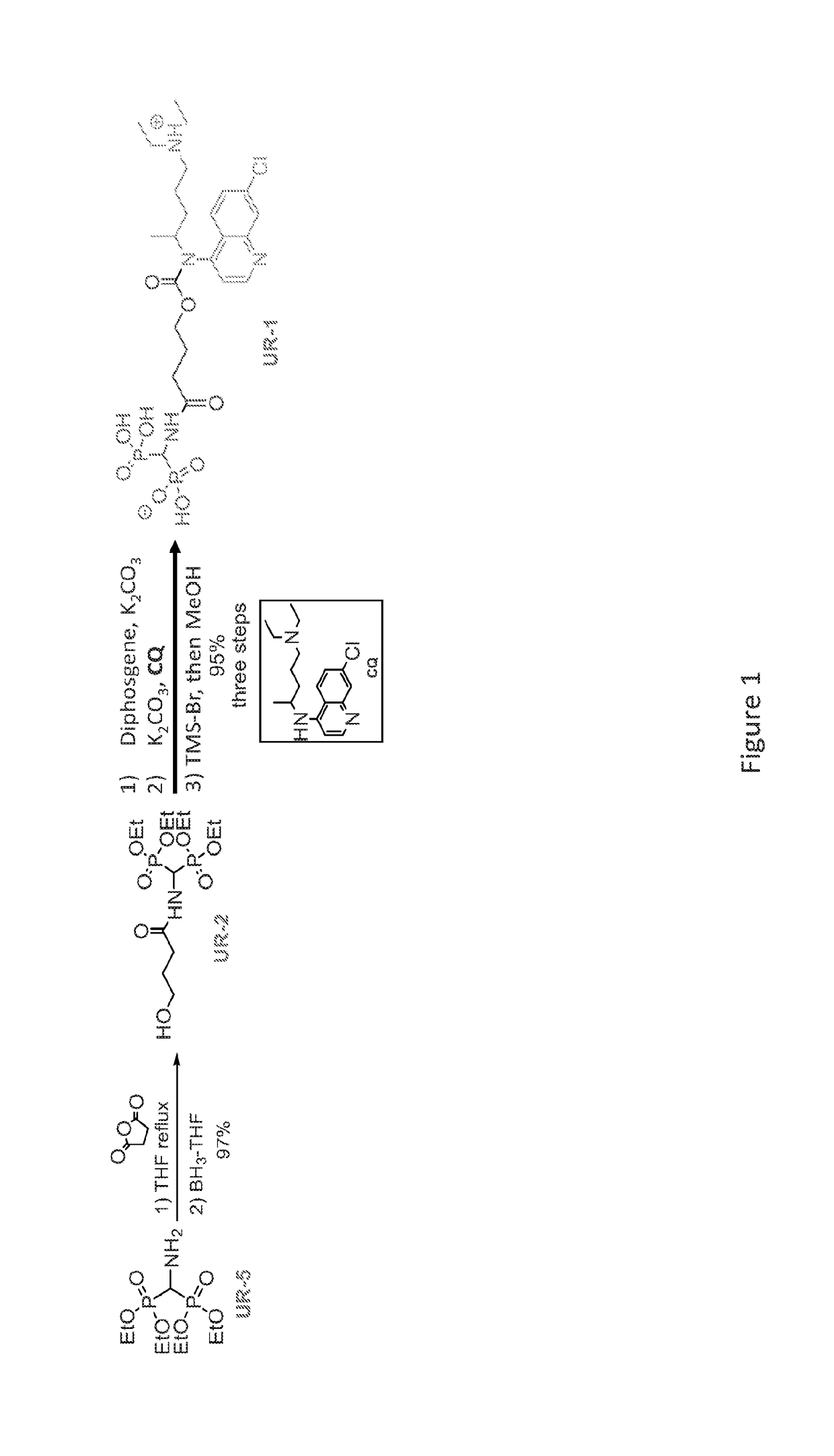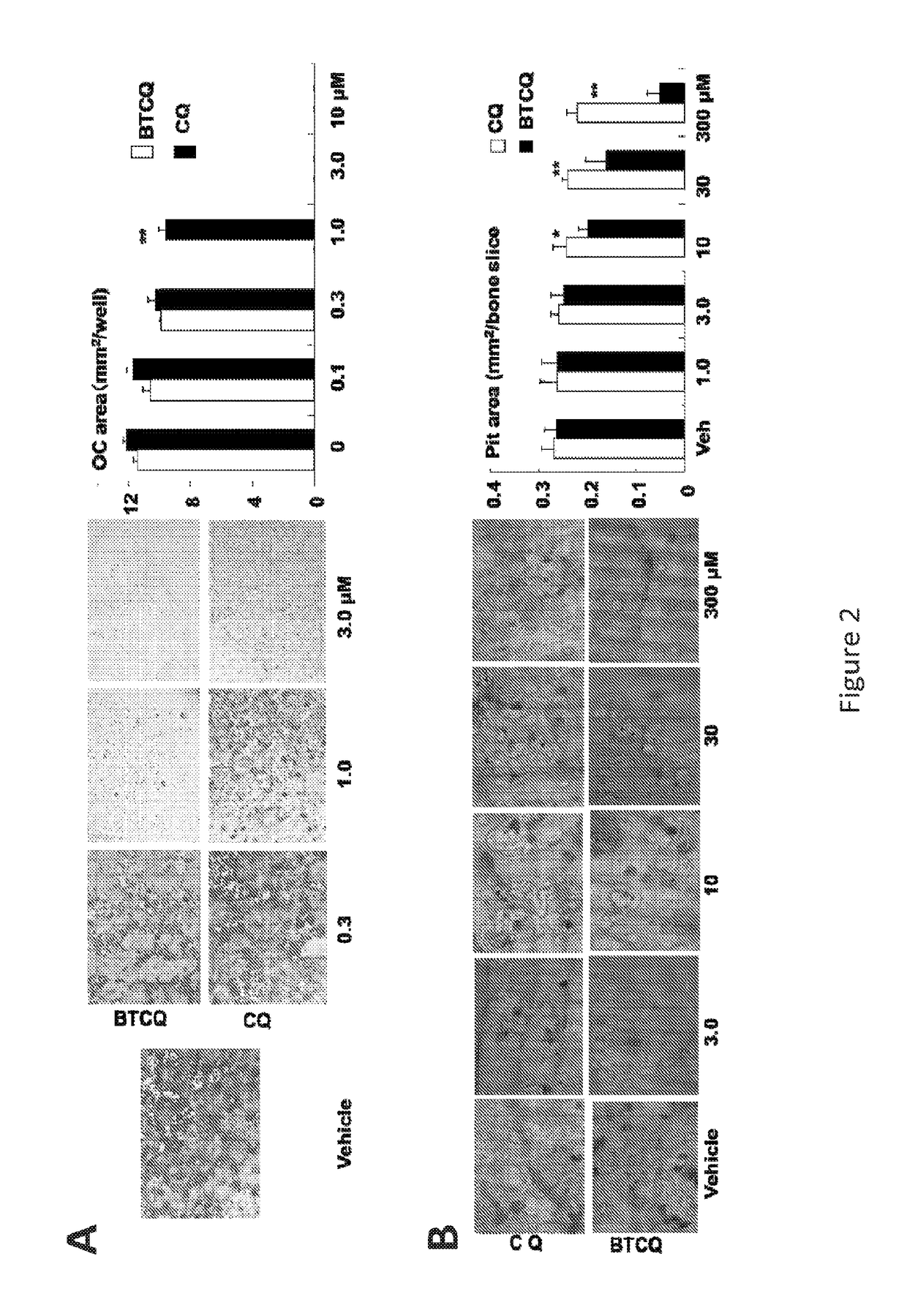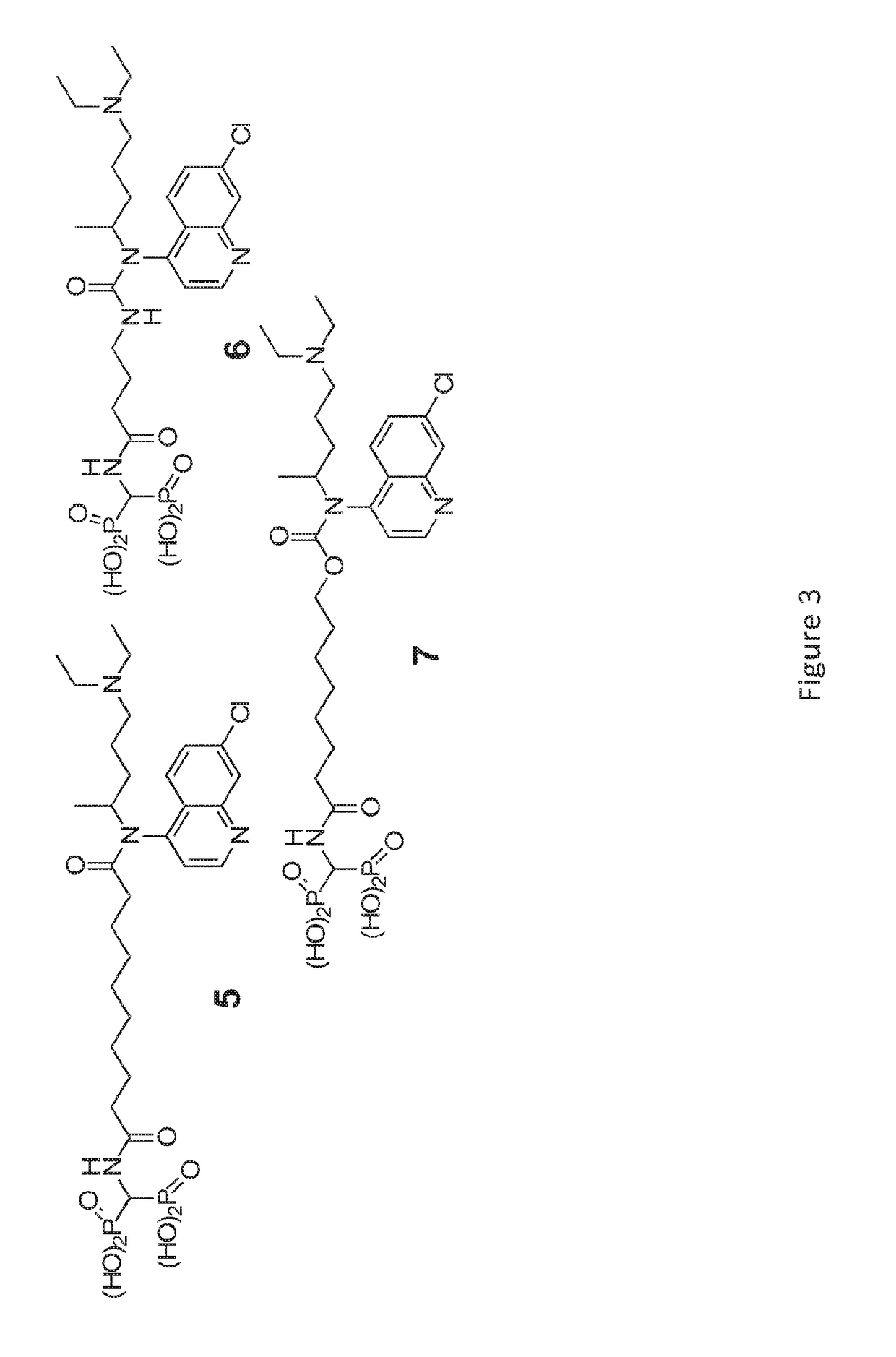Phosphonate-Chloroquine Conjugates and Methods Using Same
a technology of phosphonate and chloroquine, which is applied in the field of phosphonate-chloroquine conjugates and methods using same, and can solve the problems of poor patient compliance, increased risk of bone fracture and death, and limited use of phosphorus organic compounds
- Summary
- Abstract
- Description
- Claims
- Application Information
AI Technical Summary
Benefits of technology
Problems solved by technology
Method used
Image
Examples
example 1
of BTCQ 1
[0308]
[0309]A dry 25 mL round bottom flask under Ar was charged with tetraethyl aminomethylenediphosphonate 1 (400 mg, 1.32 mmol), and succinic anhydride (159 mg, 1.58 mmol) in dry THF (2 mL). The reaction mixture was allowed to reflux for 2.5 hr. The reaction was then cooled down to 0° C. followed by the addition of 1M BH3.THF (2.63 mL, 2.63 mmol) dropwise. After addition, the reaction mixture was warmed to rt for 1.5 hr, and was then cooled back to 0° C. and quenched with CH3OH (10 mL). The volatiles were evaporated in vacuo. The residue dissolved in 10 mL CH3OH and again concentrated in vacuo. This procedure was repeated 3 additional times. Column chromatography of the residue using a CH3OH—CH2Cl2 gradient (5:95 to 10:90) afforded 469 mg (97%) of the amide alcohol 2 as a colorless oil (Rf=0.52 (CH3OH—CH2Cl2, 1:9), visualized with KMnO4) having 1H NMR (500 MHz, CDCl3) δ 6.21 (d, J=10 Hz, 1H), 5.08-5.00 (m, 1H), 4.20 (m, 8H), 3.71 (q, 2H), 2.46 ...
example 2
nt of Bone-Targeted Chloroquine Using Novel Bisphosphonate Prodrug Technology to Inhibit Bone Resorption & Inflammation in Rheumatoid Arthritis
[0316]It was hypothesized that if CQ could be targeted to bone using compounds, such as bisphosphonates (BPs), which have high affinity for bone (Bagi et al., 2005, Adv Drug Deliv Rev), it could be administered at lower but still effective concentrations and thus side-effects could be reduced or prevented
[0317]Bone-Targeted Chloroquine (BTCQ) analogs have been generated by linking CQ to a non-bioactive BP using degradable amide linker chemistry (moieties) to determine if the CQ released in bone would have anti-osteoclast efficacy at least equivalent to CQ in standard in vitro OC formation assays. As controls, the effects of the non-bioactive BP that would be released in the bone compartment as well as a non-releasable / non-degradable amide linked conjugate that also comprises a BTCQ and resembled the degradable conjugate were also studied (FIG...
example 3
eted Chloroquine Inhibits Osteoclastogenesis and Bone Resorption More Effectively than Chloroquine
[0331]Described herein is the development of a novel bone-targeted chloroquine (CQ) conjugate (BTCQ) by linking CQ to a bisphosphonate (BP) with high affinity for bone, but no anti-OC activity. This conjugate will employ a linker that is stable in the bloodstream, but will be cleaved in the environment of the bone compartment. Lower, yet effective concentrations of CQ will thus be preferentially delivered to bone and directed away from other tissues to reduce adverse effects.
[0332]The materials and methods employed in these experiments are now described.
[0333]Chemical Synthesis of BTCQ:
[0334]The chemical synthesis of BTCQ and NC-BTCQ is described in FIGS. 1 and 5, respectively.
[0335]Osteoclastogenesis Assay:
[0336]Bone marrow cells from C57Bl6 mice were treated with M-CSF for 2 d to generate OC precursors (OCPs), which were then treated with RANKL plus CQ or BTCQ for 2-3 days to generate...
PUM
| Property | Measurement | Unit |
|---|---|---|
| Therapeutic | aaaaa | aaaaa |
| Bioabsorbable | aaaaa | aaaaa |
Abstract
Description
Claims
Application Information
 Login to View More
Login to View More - R&D
- Intellectual Property
- Life Sciences
- Materials
- Tech Scout
- Unparalleled Data Quality
- Higher Quality Content
- 60% Fewer Hallucinations
Browse by: Latest US Patents, China's latest patents, Technical Efficacy Thesaurus, Application Domain, Technology Topic, Popular Technical Reports.
© 2025 PatSnap. All rights reserved.Legal|Privacy policy|Modern Slavery Act Transparency Statement|Sitemap|About US| Contact US: help@patsnap.com



